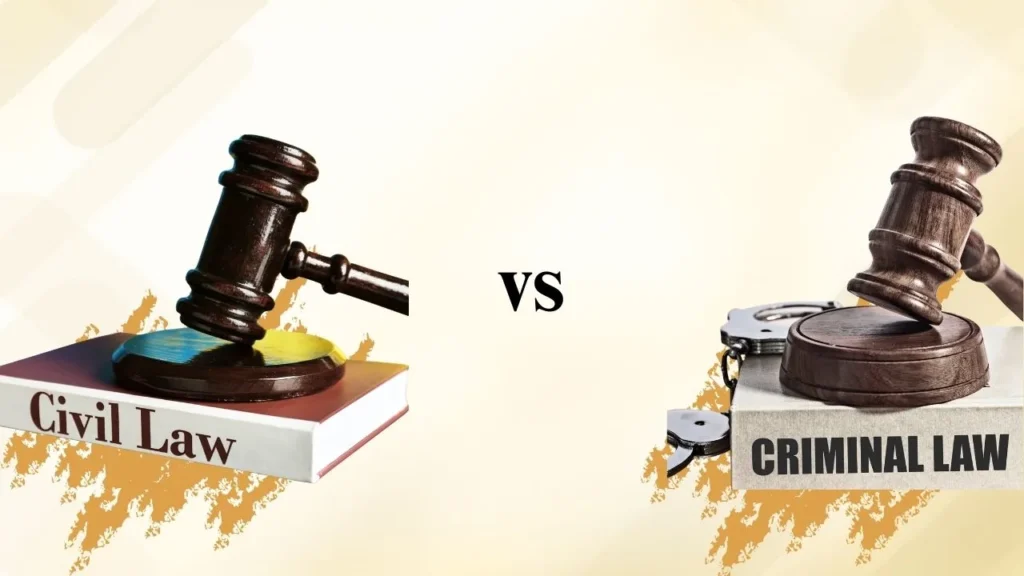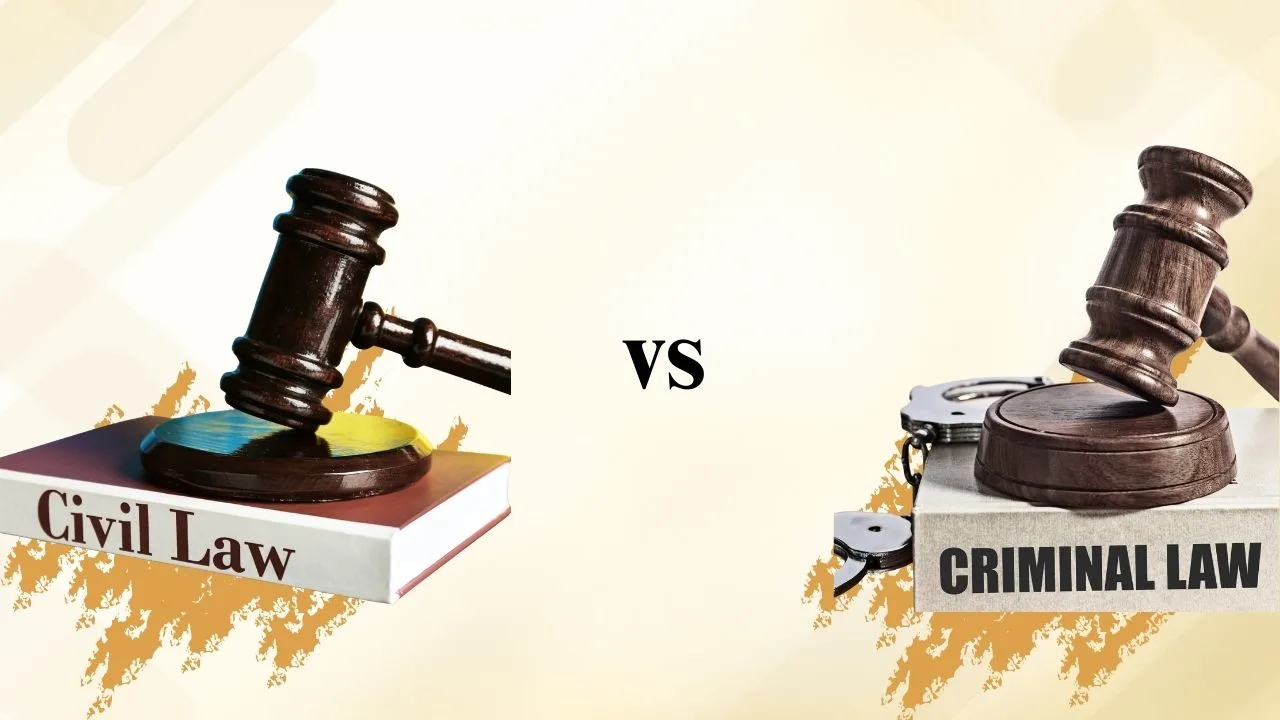Civil vs Criminal Cases.When people think about going to court, they often imagine dramatic trials with lawyers shouting “objection!” and the juries delivering life-changing decisions. But not every legal case is the same. In fact, there are two main types of cases in our justice system that are civil cases and criminal cases.
At first sight, they might look similar as both involve a judge, lawyers, and sometimes a jury. Both depend on evidence, testimony, and legal rules. But the main difference between these cases are the purpose, process, and consequences of them. Understanding these differences matters because it affects the rights of the people involved, the kind of proof required, and the possible outcomes.
Civil vs Criminal Cases-Overview
| Civil Cases | Criminal Cases |
| Disputes between private parties | Brought by the government against an accused person or entity |
| Plaintiff sues the defendant | Prosecutor charges the defendant |
| Aim to get the Compensation or court order | Aim in demand of Punishment and public safety |
| Standard of proof: Preponderance of the evidence | Standard of proof: Beyond a reasonable doubt |
| Common outcomes: settlement, dismissal, or damages | Common outcomes: not guilty, guilty, dismissal, or plea deal |
| Penalties usually involve money or injunctions | Penalties may include fines, probation, jail, or prison |
| No guaranteed right to a free lawyer | Right to a lawyer; court provides one if defendant cannot afford it |
The Basic Difference
In a civil case, one person or group believes another caused them harm such as financial, physical, or otherwise and they want compensation or a court order to fix the problem. For example, if someone crashes into your car and refuses to pay for the damage, you can take them to civil court.

A criminal case is filed against the individual when he/she is accused of breaking the law and by the government. The defendant is not just accused of harming one person but their actions are seen as a threat to public order. Crimes like theft, assault, fraud, or murder are prosecuted by the state, and the punishment can include fines, probation, or even prison time.
Who Are the Parties?
In a civil case, there are two main parties that are involved and mentioned below:
- The plaintiff – The person or business who files the lawsuit, claiming harm.
- The defendant – The person or the business or business place which is being accused of causing that harm.
The criminal case stated that the dispute is not private. It is brought by the government. The parties involved the following parties:
- The prosecutor – It represents the federal and state Government against the defendant or who has committed any crime.
- The defendant – The individual accused of committing a crime.
What’s at Stake?
The goals of civil and criminal cases are very different as both are of different types and intentions.
The Civil cases having the aim is usually to make the injured party “complete” again. This also means to provide the claim money to cover the damages such as medical bills, lost income, or pain and suffering. Sometimes, the court issues an injunction, which is an order requiring someone to stop doing something like breaking a contract or to take action like paying child support.
But criminal cases are different from civil cases as they focus on punishment and public safety. If anyone or who is the defendant is found guilty, the penalties may include jail or prison time, fines, probation. In very serious cases, like murder, some states even allow the death penalty. The purpose is not just to make the victim ok or complete as it holds the offender’s answer to the society.
The Burden and Standard of Proof
The other biggest difference among these cases is how much proof is required to win the case.
In civil cases, the plaintiff must prove their case by a “preponderance of the evidence.” This means it only has to be more likely than not (just over 50%) that the defendant is responsible. Some special civil cases, like fraud, may require a higher standard called “clear and convincing evidence.”
In criminal cases, the prosecutor must prove the guilt of the defendant “beyond a reasonable doubt.” This is the highest standard in law. It doesn’t mean there can’t be any doubt at all, but the evidence must be so strong that a reasonable person would have no serious hesitation in believing the defendant is guilty.
The Role of Lawyers and Rights of Defendants
In criminal cases the defendants have many protections by constitution. They have the right to an attorney, and if they can not afford one, the court must provide a public defender. They also have the right to remain silent, the right to a trial by jury, and the protections against unlawful searches or seizures.
But in civil cases, these rights don’t always apply. The defendants can hire their own lawyers, but if they can’t afford one, they usually have to represent themselves.
Intent vs. Negligence
Another important difference is whether the intent matters.
Intent is not always required in the Civil cases as many lawsuits are based on negligence, which means that the defendant didn’t intend to cause harm but acted carelessly.
In criminal cases, most charges require proof of a culpable state of mind that the defendant acted intentionally, knowingly, recklessly, or with criminal negligence. However, some crimes are a strict liability, like driving under the influence, where intent doesn’t matter.
Conclusion
Civil and criminal cases may look alike on the surface, but they serve for very different purposes. Civil law focuses on disputes between the individuals or organizations, aiming to provide compensation or corrective action. The criminal law is run according to the aim that the society should be protected by punishing those who break the law.
| Home Page | https://sbbarristers.com/ |
FAQs for Civil vs Criminal Cases
Ques.1. Who brings the case in civil vs. criminal matters?
The plaintiff sues the defendant in civil cases but in criminal cases, the defendants are prosecuted by the government.
Ques.2. What is at stake in each type of case?
Civil cases usually involve financial compensation or court orders but criminal cases can result in fines, probation, or jail/prison time.
